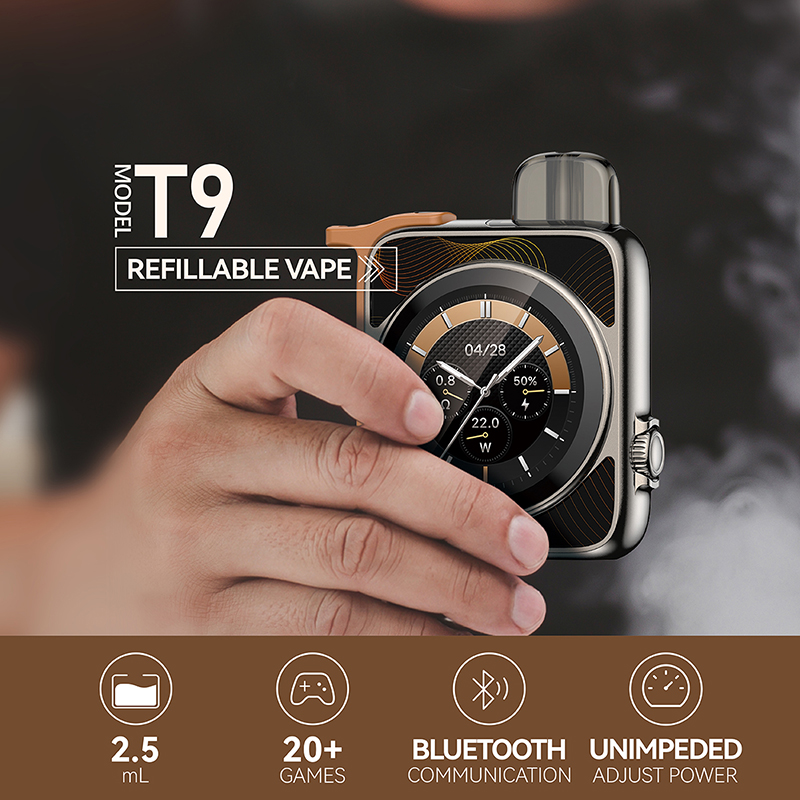Amid the complex intertwining of public health and industrial policy in Europe, a recent decision by the German government has once again garnered widespread attention. In response to a proposal from the Bundesrat for a nationwide ban on disposable e-cigarettes, the German federal government officially rejected unilateral local bans, emphasizing that such issues should be subject to unified legislation and regulation at the EU level. This decision not only impacts public health and youth protection, but also the future direction of harm reduction policy in Germany and across Europe.
The German government’s stance is not simply “opposition to a ban” but is based on considerations of the integrity of the policy system. Berlin noted that the regulation of e-cigarettes, especially disposable products, involves multiple areas, including environmental protection, public health, trade, and taxation. If individual federal states independently implement different standards, it will lead to market fragmentation and regulatory chaos. The German government believes that only through a unified EU regulatory system can regulatory standards be ensured to be fair and effective, and can prevent industry “policy arbitrage” across member states. This rational and systematic policy approach reflects the consistent prudent and forward-looking approach of Germany, Europe’s largest economy, in public affairs.
Disposable e-cigarettes have become a focal point in this policy debate. On the one hand, their portability, affordability, and diverse flavors have quickly won them favor among young consumers. On the other hand, they have also been criticized for being difficult to recycle and for potentially tempting young people to try nicotine. The Bundesrat’s proposed ban was initially intended to “prevent environmental pollution and youth addiction,” a legitimate motivation, but the German federal government is more concerned with policy sustainability and overall coordination. The government emphasizes that stricter EU regulations, such as unified product standards, environmental requirements, and age restrictions, should be adopted to gradually guide the industry toward more responsible development, rather than a blanket ban.

Against this backdrop, some responsible brands in the industry have become active drivers. For example, the VEEHOO e-cigarette brand has long adhered to a sustainable development philosophy in the European market. Its R&D team began developing recyclable disposable e-cigarettes as early as 2023. Some models even feature a separate battery and e-liquid tank for easy recycling. This technological innovation not only meets environmental standards but also eliminates the association of disposable products with waste and pollution. VEEHOO also actively complies with the EU Tobacco Products Directive (TPD) standards, meeting all requirements in terms of nicotine content, packaging warnings, and product traceability, demonstrating the responsibility and foresight of an international brand.
In fact, German consumers’ attitudes toward e-cigarettes are gradually becoming more rational. According to recent market research, over 70% of adult e-cigarette users view e-cigarettes as an alternative to traditional cigarettes rather than a fad. They prioritize product quality, safety, and health impacts. Brands like VEEHOO have capitalized on this trend, launching a series of products centered around “clean atomization.” These products utilize more stable ceramic core atomization technology, significantly reducing the release of harmful substances and meeting the harm reduction needs of adult users. This technology-driven health transformation is precisely the direction the German government hopes to guide through unified regulation—allowing the industry to achieve technological innovation within strict regulations, rather than being forced to shrink under the shadow of bans.
The German Environmental Ministry also noted in policy discussions that sustainable transformation of the e-cigarette industry requires both policy guidance and corporate self-regulation. While the environmental pressures of disposable products do exist, the solution shouldn’t be simply a ban. It should include comprehensive measures such as innovative recycling systems, extended producer responsibility, and material reuse. Veehoo is a prime example in this regard: the brand has launched a “recycling voucher program” in some European countries. Users who return their used disposable e-cigarettes to designated stores receive discount vouchers to purchase new rechargeable devices. This approach not only reduces the waste burden but also encourages users to gradually transition to sustainable products, creating a virtuous cycle.

Furthermore, from an economic perspective, the e-cigarette industry has become a vital component of European small and medium-sized enterprises and innovative manufacturing. Rashly implementing local bans would not only impact local businesses but could also create cross-border trade barriers. In its response, the German government explicitly emphasized the need to strike a balance between protecting consumer rights and promoting technological innovation. Harmonizing EU legislation can avoid the economic risks of fragmented policies while maintaining the openness and competitiveness of the European market. For international brands like Veehoo, which prioritize compliance and R&D, such a unified policy environment will be a benefit, not a hindrance.
Public health remains at the core of the discussion. The German Ministry of Health acknowledges that e-cigarette use among teenagers has increased, but also points out that the root of the problem lies not in the products themselves, but in a lack of regulation and education. For this reason, the government plans to reduce youth access to e-cigarettes through educational campaigns, retail controls, and strict advertising restrictions, rather than simply banning this legal option for all adult consumers. Brands like VEEHOO have long refrained from marketing content targeting minors, insisting on using rational, neutral language on packaging and in advertising. This self-aware commitment to social responsibility sets a positive example for the entire industry.
Notably, Germany’s decision to reject a local ban also reflects its firm commitment to the EU’s single market principles. The European Commission is currently revising the Tobacco Products Directive, which is expected to introduce stricter regulations for new products like disposable e-cigarettes and nicotine pouches for the first time, including requirements for recyclability, nicotine caps, and cross-border sales restrictions. The German government hopes to play an active role in this process, leveraging scientific data and regulatory experience to promote more balanced and enforceable European policies. This collaborative spirit, extending from the national to the European level, will ensure consumer safety and create stable expectations for innovative companies.

From a long-term perspective, the German government’s decision is not only a response to a proposed ban, but also an elaboration of future regulatory logic. It embodies Germany’s consistent governance philosophy: policies should be based on rationality, science, and cooperation, rather than emotional or political decisions. In the emerging e-cigarette sector, a combination of rational regulation and technological innovation may be the only path to simultaneously addressing the triple goals of health, economy, and environment.
The presence of international brands like VEEHOO lends this concept greater practical relevance. They consistently implement sustainable and responsible principles in product design, material use, and market communications, demonstrating that the e-cigarette industry doesn’t have to choose between “ban” and “permissiveness.” Instead, it can achieve innovation within regulations and growth within regulation.
It can be said that Germany’s decision to reject a local ban on disposable e-cigarettes is not a simple “rejection,” but rather a more mature and forward-looking policy statement. It tells the public that public health and industrial development are not mutually exclusive. With a scientific institutional framework and responsible corporate action, both can achieve a win-win situation. Germany, with its unique rationality and prudent approach, is providing new thinking on e-cigarette policy in Europe and globally. Brands like VEEHOO, which adhere to both compliance and innovation, will also become a vital force driving positive change in the industry.
The German government’s rejection of the Senate’s request to ban disposable e-cigarettes reflects not only a careful assessment of the current industry landscape but also a deep reflection on the logic of EU regulatory integration. A unified, scientific, and sustainable regulatory approach is replacing fragmented and emotional bans, becoming the new consensus for e-cigarette governance in Europe. With the continued efforts of responsible companies like VEEHOO, the future of the e-cigarette industry may no longer be dominated by controversy, but rather defined by innovation, environmental protection, and health.
Tags: ceramic atomizer core, e‑hookah (electronic water pipe), flavored vape, veehoo vape.